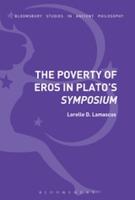
Bloomsbury (2016) h/b 188pp £84.99 (ISBN 97811474213806)
Plato’s Symposium is one of the most widely read of his works and has accordingly engendered a large number of translations, monographs, articles and dissertations (this volume is one of the latter) from antiquity to the present day. To the majority of Plato’s readers, the most important of the seven speeches delivered at the symposium is that of Socrates, in which he recounts the teaching on Love (Eros) given to him by a prophetess-like figure, Diotima. At the outset she offers an allegory of Love as the child of Poverty (Penia) and Resourcefulness (Poros). It is on the element of poverty in Love that L. chooses to focus her work.
The starting point (in the introductory chapter 1) is a historical survey of different interpretations of the nature of Love, which have been dominated since the latter part of the 20th century by Gregory Vlastos’ article The Individual as Object of Love in Plato (in Platonic Studies 1: Princeton 1973), which L. calls ‘the egoistic’ interpretation, presenting Love as self-interested and acquisitive. Crediting Catherine Osborne and Frisbee Sheffield with a non-Vlastian interpretation, L. attempts to show that the Vlastian interpretation ‘does not resonate with Plato’s presentation of Eros in the Symposium or his other works in which Eros and reason are presented as properly in accord with one another’ (p.1). She seeks to show that progressively through the Symposium, and especially in Diotima’s words, the element of poverty in Love’s nature is overshadowed by ‘lack of envy/greed/graspingness’.
Her textual evidence is in particular the passage at 210c-d, where the lover is urged to proceed beyond instances of beauty to a vision of Beauty itself. L.’s argument is that in the latter stages of the ascent of the soul, passion combines with reason to produce a proper balance in the individual in accordance with the principles of the Republic. L. depends, however, on choosing the less obvious meaning of the word aphthonos (lit. ‘lacking in envy’ but more usually ‘abundant, generous’, as, for example, Waterfield: ‘he faces instead the vast sea of beauty, and in gazing upon it his boundless love of knowledge becomes the medium in which he gives birth to plenty of beautiful, expansive reasoning and thinking…’ (Penguin Classics, Plato Symposium p.54).
This crucial part of her argument, in chapter 3, leaves too many loopholes and needs much fuller discussion. Her section on aphthonos on pp. 65-6 is too brief and devotes overmuch space to other dialogues. She fails to discuss the full range of meanings of aphthonos/aphthonia, and appears to treat the former as a noun, and she discards largely the noun philosophia, making the ‘lack of envy’ refer to Love rather than to the lover or to philosophy. Hence she fails to make a sufficient case for her reading as against the Vlastian egoistic version.
Otherwise there are good discussions of several topics that support her argument, for example myth and allegory in Plato, the meaning of penia as moderate asceticism rather than destitution, the intermediacy (to metaxu) of Love, and purification. There is a good bibliography, but no index locorum: the General Index is sketchy, consisting mainly of names of authors quoted. Misprints are few, but Myles Burnyeat’s first name is misspelt; Greek terms are not well handled, sometimes presented only in Greek script (sometimes in italics, sometimes not), sometimes in Greek with English version, sometimes in transliteration (but why arête for ‘virtue’?), so that readers without Greek will on occasions be at a loss. In several places the breathing and accent are placed above, rather than before, initial capitalised vowels.
All in all, this book offers interesting insights and sheds some new light on this much read text. It should find its way into university libraries.
Barrie Fleet—Corpus Christi College, Cambridge
